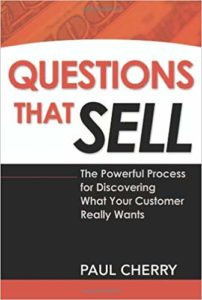Business Blog Readers are Looking for a Fix

“Can you email me the information?” is never a request any sales professional wants to hear, admits Paul Cherry, author of Questions That Sell. What should the salesperson do? Agree, then clarify, is his suggestion. Ask the prospect: “ What kind of information will be most useful to you? What are you looking to accomplish?”
Salespeople should look for certain key words in their prospects’ answers, Cherry says. Those words reveal if the “targets” have any real interest in the product or service.
“We are looking to:
- achieve…
- solve…
- eliminate…
- avoid…
- secure…
- improve…
- fix…
For most business owners, when asked why they want to use social media, their answers come down to one thing – selling more stuff. In fact, as internet marketing consultant Chris Garrett remarks, “The blogosphere is coming around to the idea that commerce is not necessarily evil, that in fact businesses need to make money and they do that by selling stuff.”
Effective blog content drip-drip-drips the necessary benefit-led, fact-filled, objection-busting content to your targeted audience, in such a way that they don’t feel they are being sold to, Garrett explains. His own way of describing the blogging sales cycle is as a series of small agreements, where the prospect clicks to the blog, reads content, subscribes to the blog, signs up for an e-newsletter, and finally decides to call or write.
Jeff Thrull, author of another sales training book, Exceptional Selling, advises sales professionals to act against type:, “When in doubt, so the opposite of what a salesperson would do.” The good news in blog marketing is the same as the good news Thrull describes as operative in direct selling. At Say It For You, I advise using blog posts to demonstrate the business owner’s or professional practitioner’s expertise, and to offer valuable tips to readers.
At Stage #1 of their search, what the majority of consumers are likely to have typed into the search bar are words describing:
- Their need
- Their problem
- Their idea of the solution to their problem
- A question
In short, those searchers’ first encounter with your business or practice is based on their need for help to do the very things Paul Cherry named in his keyword list: they want to achieve, eliminate, avoid, secure, improve, and FIX.
No, you’re not in their living room or on the phone with them, but, in order convert those “strangers” to friends and customers, then, address your blog posts to them, and write about how you can help them do exactly those things.

Leave a Reply
Want to join the discussion?Feel free to contribute!